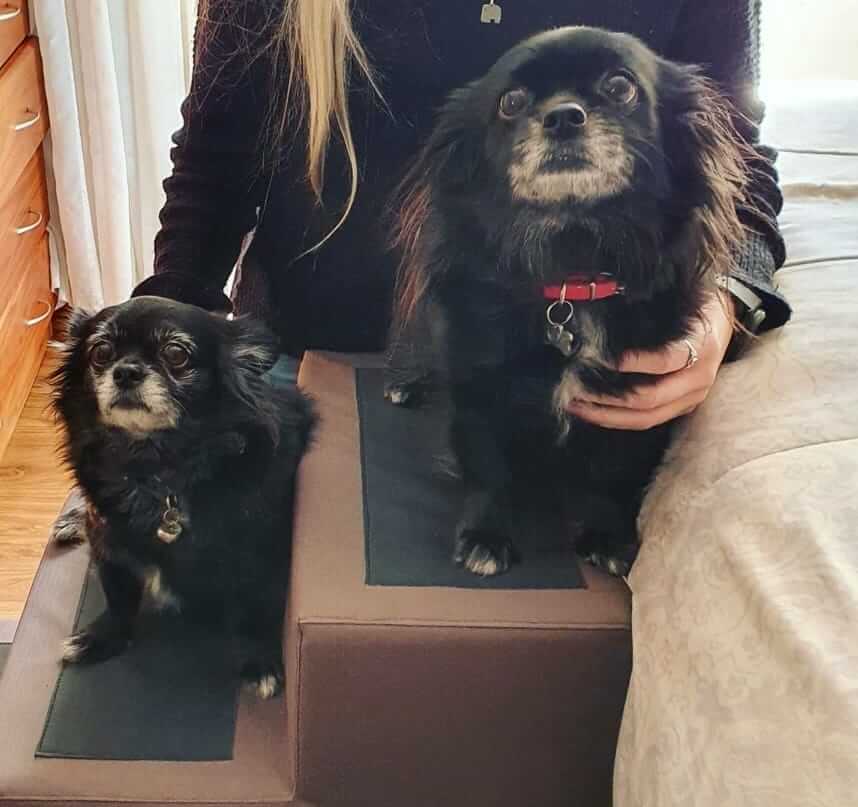Have you lost that loving feeling?

Meet Bella and Coco, two 12-year-old sisters. Their mum, Tuli, got them when they were pups.
They have been living with Tuli and her family for many years and have always had a strong bond. Up until recently, as they have grown older, Coco has become quite intolerant of Bella. Coco’s behaviour towards her sister is leaving their mum speechless.
Tuli says that sometimes it gets so bad that they need to be separated for the night. Samantha, Tuli’s daughter, will need to fetch one of them for a sleepover at her house.
The fact that Coco prevents Bella from eating is heart-breaking to the family and they cannot understand why Coco has lost her loving feeling for Bella. Luckily, Tuli’s family have learned some workarounds such as feeding the two separately and making sure, where possible, they are not left to their own devices so that Coco is not given the opportunity to boss Bella around.
This behaviour is not uncommon when two dogs that has been living together, start to get older (whether they are siblings or not).
When an older dog has any medical or degenerative illness that causes pain, discomfort, or decreased mobility such as arthritis can lead to them being sensitive and irritable.
We can relate to this as people, as we don’t have the same bounce in our step than what we did when we were 20! Sometimes we wake up with aches and pains or the same level of tolerance and energy that we didn’t have the previous day, which obviously affects our mood.
As your dog ages, they suffer from a decline in functioning. Their memory starts going and their ability to learn, their sight and hearing can deteriorate. They start forgetting their previously learned behaviour such as coming when called or house training.
In one of the articles on Senior Tail Waggers, Dr. Winnie who is a qualified veterinarian wrote that an old dog’s behaviour has different levels of intensity, ranging from mild irritability to all-out aggression. She suggests that if your senior dog is suddenly more irritable don’t just think it is old age. They might be suffering from physical or mental conditions.
She further says that bad temperaments in senior dogs are often caused by one of the following four reasons:
- Pain or discomfort
- As your dog gets older, they could experience pain such as arthritis. Since they can’t speak for themselves, it is important to take them for regular visits to your vet to make sure that you are doing the most that they can do to alleviate or minimise their pain levels.
- Fear or anxiety
- Some dogs start showing signs of anxiety as they get older, regardless of how confident they were in their youth. They might start getting excessive panting, sleeping problems, restlessness, or loss of appetite.
- Canine Cognitive Dysfunction (Doggie Dementia)
- This condition is quite common in older dogs and is similar to Alzheimer’s in humans. You would be able to pick this up on your dog’s behaviours noticing things like changes in sleeping habits, getting lost easily, restless roaming, and loss of bladder control, just to name a few.
- Loss of senses such as sight or hearing
- Just like humans’ older dogs develop vision problems but unfortunately, they don’t have the luxury of getting glasses. You will notice some changes such as hesitating to go from a light to a dark room and vice versa, missing a step, or not being able to play fetch like they used to.
They say you can’t teach an old dog new tricks, but we can show you a few tricks to help you look after your senior dog.
- Temperature – older dogs are sensitive to heat so if you are taking them for a walk make sure they are comfortable and not overheating.
- “Age-proof” – your house to accommodate for poorer vision and difficulty walking or seeing.
- Bad breath – dogs develop dental problems as they get older and that could lead to smelly breath. Speak to your vet for tips on how to look after your dog’s teeth.
- Regular vet visits – ensure that you take your dog for regular vet visits. They might deteriorate quickly so you will need to be on top of their health for early diagnosis and therapy to prolong their life.
- Food – older dogs might not need as much food as when they were younger. Consult with your vet to see what the right diet is for your dog and how much you should feed them.
Remember, their moods might have changed but they still need just as much love and care as they did when they were younger, they might even need more!
Ref: https://seniortailwaggers.com/senior-dogs-becoming-grumpy/
